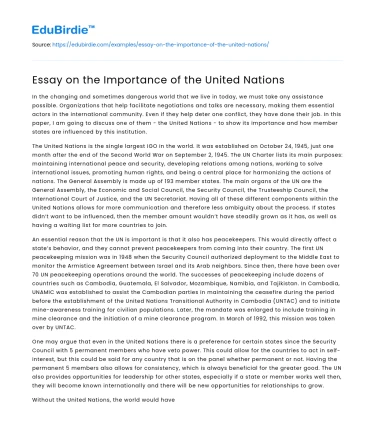In the changing and sometimes dangerous world that we live in today, we must take any assistance possible. Organizations that help facilitate negotiations and talks are necessary, making them essential actors in the international community. Even if they help deter one conflict, they have done their job. In this paper, I am going to discuss one of them - the United Nations - to show its importance and how member states are influenced by this institution.
The United Nations is the single largest IGO in the world. It was established on October 24, 1945, just one month after the end of the Second World War on September 2, 1945. The UN Charter lists its main purposes: maintaining international peace and security, developing relations among nations, working to solve international issues, promoting human rights, and being a central place for harmonizing the actions of nations. The General Assembly is made up of 193 member states. The main organs of the UN are the General Assembly, the Economic and Social Council, the Security Council, the Trusteeship Council, the International Court of Justice, and the UN Secretariat. Having all of these different components within the United Nations allows for more communication and therefore less ambiguity about the process. If states didn’t want to be influenced, then the member amount wouldn’t have steadily grown as it has, as well as having a waiting list for more countries to join.
Save your time!
We can take care of your essay
- Proper editing and formatting
- Free revision, title page, and bibliography
- Flexible prices and money-back guarantee
An essential reason that the UN is important is that it also has peacekeepers. This would directly affect a state’s behavior, and they cannot prevent peacekeepers from coming into their country. The first UN peacekeeping mission was in 1948 when the Security Council authorized deployment to the Middle East to monitor the Armistice Agreement between Israel and its Arab neighbors. Since then, there have been over 70 UN peacekeeping operations around the world. The successes of peacekeeping include dozens of countries such as Cambodia, Guatemala, El Salvador, Mozambique, Namibia, and Tajikistan. In Cambodia, UNAMIC was established to assist the Cambodian parties in maintaining the ceasefire during the period before the establishment of the United Nations Transitional Authority in Cambodia (UNTAC) and to initiate mine-awareness training for civilian populations. Later, the mandate was enlarged to include training in mine clearance and the initiation of a mine clearance program. In March of 1992, this mission was taken over by UNTAC.
One may argue that even in the United Nations there is a preference for certain states since the Security Council with 5 permanent members who have veto power. This could allow for the countries to act in self-interest, but this could be said for any country that is on the panel whether permanent or not. Having the permanent 5 members also allows for consistency, which is always beneficial for the greater good. The UN also provides opportunities for leadership for other states, especially if a state or member works well then, they will become known internationally and there will be new opportunities for relationships to grow.
Without the United Nations, the world would have a significantly higher amount of issues since communication and setting norms would be much more difficult. This institution allows the world to work in unison together. Its every state or member is now being shown habits of cooperation since regular interactions occur. There is the overall argument that a country can leave when its policy isn’t what a state would want. That is fine, but it is not easy to join right back into the organization. There is a process to go through and a member state wouldn't throw that wat after working hard to become a part of the organization. Altogether, the United Nations plays a very important role and not only influences states' preferences but also behavior.






 Stuck on your essay?
Stuck on your essay?

